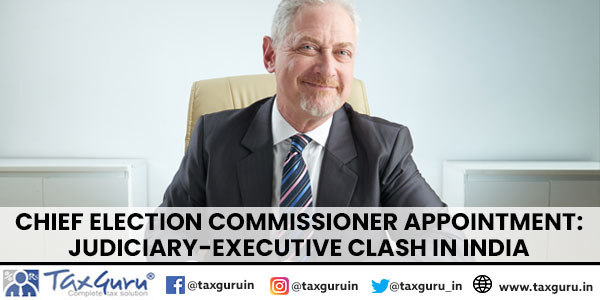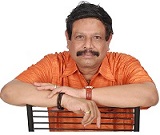Appointment of The Chief Election Commissioner-The Constitutional Tussle Between The Judiciary And The Executive – When Did It Begin And Where Shall It End?
Introduction
The appointment process of the Chief Election Commissioner (CEC) in India has long been a focal point of constitutional contention, highlighting the delicate balance of power between the judiciary and the executive branches of government. Recent developments have intensified this debate, prompting a reevaluation of the legal and constitutional frameworks governing the appointment of Election Commissioners. This article delves into the historical backdrop, scrutinizes recent legislative endeavors, and dissects the ongoing constitutional confrontation between these two pivotal arms of the state.
THE CHRONICLE BRIEFLY AND LOGICALLY ARRANGED BELOW
1. Yesterday, February 13, 2024, a two-judge Bench of the Supreme Court, for the second time in recent weeks, refused to stay the new law governing the appointment of Election Commissioners [Association for Democratic Reforms v. Union of India].
The new Act, passed by the 17th parliament, called “THE CHIEF ELECTION COMMISSIONER AND OTHER ELECTION COMMISSIONERS (APPOINTMENT, CONDITIONS OF SERVICE AND TERM OF OFFICE) ACT, 2023”, ACT NO. 49 OF 2023, CAME INTO EFFECT ON [28th December, 2023.] The PM MODI Government had initiated this enactment, repealing the Act of 1991, passed by the parliament when V.P. Singh was the PM.
2. WHAT DOES THE CONSTITUTION SAY?
Article 324 (2) lays down that the Chief Election Commissioner and other Election Commissioners shall be appointed by the President, subject to any law passed by the Parliament in this regard.
3. NO CENTRAL GOVT GOT ANY LAW PASSED BY PARLIAMENT TILL 1991
So, for almost 71 years from 1952, when the first election to the LS was held, till 2023, the EXECUTIVE (the Central Govt) kept the appointment of the Chief Election Commissioner its EXCLUSIVE PRIVILEGE.
The Prime Minister used to appoint a screening committee, and from its recommendations, used to advise the President to appoint the candidate selected by it as the CEO, and the President used to issue the appointment orders as per this advice.
There was no consultation with the Opposition on this appointment.
4. Rajiv Gandhi appointed two “Election Commissioners”, in addition to the CEC, in 1989, as permitted by Article 324.
In 1989, against a backdrop of escalating tensions between his administration and the then Chief Election Commissioner R V S Peri Sastri, Rajiv Gandhi took the significant step of augmenting the Election Commission’s structure. The discord, stemming from contentious interactions during the 1987 Presidential election, propelled Rajiv Gandhi’s government to dilute Peri Sastri’s authority. This was achieved by transitioning the Commission from a single-member to a three-member entity, as authorized by Article 324.

On October 7, 1989, leveraging Article 324(2), President R Venkataraman formalized this expansion through a notification that established two additional roles within the Commission, effectively reducing the unilateral control wielded by the CEC. Subsequently, on October 16, 1989, S S Dhanoa and V S Seigell were appointed to these newly created positions, marking a decisive move by the executive to modify the Commission’s composition without the backing of specific legislation.
5. The Congress lost power in the elections, and Prime Minister V P Singh’s National Front government quickly rescinded the October 7, 1989 Presidential Notification.
V.P Singh then passed in the parliament “The Election Commission (Conditions of Service of Election Commissioners and Transaction of Business)] Act, 1991.
This Act DISBANDED the offices of the additional two Election Commissioners and kept the CEC as the SOLE Election Commissioner.
CONSPICUOUSLY, THIS ACT EVADED THE ISSUE OF FORMING A COMMITTEE, INCLUDING THE OPPOSITION, TO ADVISE THE PRESIDENT ON THE APPOINTMENT OF THE CEC.
6. PVN RAO’S TURN TO BRING IN THE ADDITIONAL TWO ECs
T.N. Seshan’s appointment as the Chief Election Commissioner (CEC) on December 12, 1990, marked a turning point in the Election Commission of India’s history. Known for his uncompromising integrity and vigorous enforcement of electoral laws, Seshan’s tenure was characterized by his relentless pursuit of a fair and transparent electoral process. In response to his assertive reforms, the Congress-led government under Prime Minister P.V. Narasimha Rao took steps to dilute the CEC’s sole authority by expanding the Election Commission once more on October 1, 1993. The government appointed M.S. Gill and G.V.G. Krishnamurthy as Election Commissioners (ECs), thereby reinstating the Commission as a multi-member body.
Furthermore, the government introduced an ordinance to amend the Election Commission Act, effectively leveling the playing field among the CEC and ECs. This amendment accorded all three commissioners the status of a Supreme Court judge, including the retirement age set at 65 years. This change ensured that decision-making within the Commission would be democratic, with the majority opinion holding sway in the event of disagreements.
Seshan’s challenge to this amendment, citing concerns over the dilution of the CEC’s authority, was ultimately reviewed by a five-member Constitution Bench of the Supreme Court. The bench, however, decided against Seshan, upholding the amendment and affirming the structural changes to the Election Commission. This decision was pivotal in shaping the operational dynamics of the Election Commission, emphasizing a collective decision-making process over singular authority.
7. 02. 03.2023—A five-member Constitution Bench of the Supreme Court took an UPFRONT POSITION vis-a vis THE EXECUTIVE AND THE LEGISLATURE, and UNANIMOUSLY HELD THAT A LAW SHOULD BE MADE TO APPOINT THE CEC and the other BY A COMMITTEE COMPRISING—
- The Prime Minister,
- The Leader of the Opposition, and
- THE CHIEF JUSTICE OF INDIA
[Anoop Baranwal v. Union of India and ors].
The SC pointedly said in its Order–
“Riding on the horse of independence, it cannot act in an unfair manner either. Independence must be related, finally, to the question of ‘what is right and what is wrong. A person who is weak-kneed before the powers that cannot be appointed as an Election Commissioner. A person who is in a state of obligation or feels indebted to the one who appointed him fails the nation and can have no place in the conduct of elections, forming the very foundation of democracy. An independent person cannot be biased.”
It also pointed out that several decades had passed, and political parties had not introduced a separate law to govern appointments to the ECI.
This was quite unusual since, Constitutionally, it is the sole prerogative of the Legislature (parliament in this case), and the SC has the final authority acting Suo moto, or on a challenging petition, to adjudge if the enactment passed is ultra vires the Constitution, and hence VOID.
8. PM MODI GOVERNMENT ENACTS A NEW LAW IN RESPONSE TO THE ABOVE SC JUDGMENT OF MARCH 2023
The PM MODI Government enacted the “THE CHIEF ELECTION COMMISSIONER AND OTHER ELECTION COMMISSIONERS (APPOINTMENT, CONDITIONS OF SERVICE AND TERM OF OFFICE) ACT, 2023 ACT NO. 49 OF 2023, CAME INTO EFFECT ON [28th December 2023.]
This Act, for the first time in India’s independent history, constituted a committee comprising of the—
- Prime Minister,
- Another Minister, and
- THE LEADER OF THE OPPOSITION IN THE LS
If no party had at least 10% of the total number of seats in the LS, the leader of the largest opposition party would be inducted into the Committee.
Thus, Adhir Ranjan Choudhary, the leader of the Congress party in the LS, has been appointed as a member of the Election Commissioners Committee.
The Act provides that the business of the Election Commission should be transacted unanimously whenever possible. In case of a difference of opinion, the majority’s view will prevail.
This Committee shall not have the task of selecting the new CEC and the other two ECs, since the tenure of the present incumbents shall be over only in 2027/2028.
THIS ACT CONSPICIOUSLY OMITS THE CHIEF JUSTICE OF INDIA IN THE COMMITTEE, AS HELD BY THE FIVE-MEMBER CONSTITUTION BENCH OF THE SC AS MENTIONED IN ITS ORDER IN MARCH 2023.
9. This Act has now been promptly challenged in the SC by some “Association for Democratic Reforms.”
On 13.02.2024, a two-judge Bench of the SC, for the second time in recent weeks, refused to stay the new law governing the appointment of Election Commissioners [Association for Democratic Reforms v. Union of India].
A Bench of Justices Sanjiv Khanna and Dipankar Datta stated that it cannot issue an interim stay at this stage.
It proceeded to issue notice to the Central government on the public interest litigation (PIL) filed by the Association for Democratic Reforms (ADR) challenging the new law, which “effectively gives primacy to the executive when it comes to appointing Election Commissioners.”
The SC has posted this case for hearing in April 2024.
According to my assessment, the SC shall RESERVE its judgment in view of the forthcoming 2024 LS elections.
10. WHAT WILL HAPPEN FROM NOW?
Should the two-judge Bench of the Supreme Court find the new legislation governing the appointment of Election Commissioners unconstitutional, it is anticipated that the administration under Prime Minister Modi (referred to as PM MODI-3.0 Government) would escalate the matter to a five-judge Constitutional Bench for a more authoritative adjudication. This step represents a procedural escalation within the judicial review process, aimed at challenging the initial ruling and seeking a broader consensus from a larger panel of judges.
In an effort to preclude the potential for successive appeals and to provide a definitive resolution on this matter of significant constitutional importance, the Chief Justice of India (CJI) might opt to convene an even larger bench. The contemplation of assembling a 13-judge bench, the largest Constitutional Bench conceivable within the framework of the Indian judiciary, underscores the gravity and complexity of the issue at hand. Such an unprecedented assembly would aim to deliver a conclusive judgment on the constitutional validity of the contested law, potentially setting a landmark precedent for the governance of electoral appointments in India.
Conclusion
The appointment of the Chief Election Commissioner in India encapsulates the intricate interplay between constitutional mandates and political dynamics. As the nation awaits the Supreme Court’s verdict, the integrity of its electoral process and the resilience of its democratic institutions hang in the balance. This constitutional confrontation, thus, not only challenges the existing legal paradigms but also invites a reimagining of the principles governing the separation of powers in India’s democratic setup.
References:
https://www.barandbench.com/news/litigation/breaking-supreme-court-calls-for-committee-including-chief-justice-of-india-to-appoint-election-commission-members
https://www.barandbench.com/news/supreme-court-again-refuses-stay-new-law-election-commissioner-appointments





























